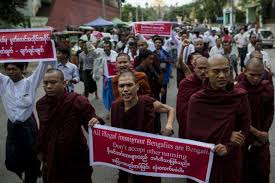YANGON, (APP/AFP) – The body representing Myanmar’s top
monks has distanced itself from a vocal Buddhist nationalist group, in an unprecedented blow to the anti-Muslim network blamed for a surge in sectarian violence across the country.
The Sangha Maha Nayaka Committee, which represents the upper echelons
of the clergy in the overwhelmingly Buddhist country, issued a statement late Tuesday saying it has never endorsed the ultra-nationalist “Ma Ba Tha”.
The Ma Ba Tha is a noisy monk-led group that has been at the
forefront of anti-Muslim protests in Myanmar in the three years since it was founded.
It recently said it was established under Sangha rules, a claim
refuted by the country’s top monks, putting clear water between the mainstream Buddhist clergy and the hardline group for the first time.
“The Ma Ba Tha organisation is not included under the basic rules,
procedures… and instructions of the Sangha organisation,” the Sangha
committee said in its statement.
“Starting from the first Sangha summit in 1980 until the fifth Sangha
summit in 2014, no Sangha meeting has acknowledged or formed the Ma Ba Tha — and it has never used the term Ma Ba Tha.”
The statement came hours ahead of a two-day gathering of around 50 of
Myanmar’s top monks in a meeting room inside a man-made cave on the outskirts of Yangon.
A Ma Ba Tha spokesman said the group was ready to accept any decision
from the clergy, but added that his grassroots network did not need official Sangha approval to exist.
“It was formed with volunteers like other organisations in the
country… registration is not needed to form that kind of organisation,” Damapiya, a senior monk in the network, told AFP.
The Ma Ba Tha emerged as potent political force under the former
military-backed government, successfully lobbying for a series of laws that
rights groups say discriminate against women and religious minorities.
Scores of people have been killed in sectarian riots that have
billowed out in step with their protests.
But the organisation lost out in November elections that saw their
allies in the incumbent party trounced by Aung San Suu Kyi’s National League for Democracy (NLD).
It has since been trying to claw back ground, in recent weeks
reviving its vitriolic rhetoric that portrays Islam as a threat to Buddhism.
Last month two mosques were destroyed by Buddhist mobs in the centre
and north of the country.
Much of the anti-Muslim invective in Myanmar has targeted the
Rohingya — a minority denied citizenship and relegated to apartheid-like conditions ever since deadly riots tore through western Rakhine state in 2012.
Their very name invokes strong emotions in Myanmar, with the Ma Ba
Tha leading protests for the Rohingya to be known only as “Bengalis” — shorthand for illegal migrants from neighbouring Bangladesh.
De facto premier Aung San Suu Kyi has faced widespread censure from
rights groups for failing to speak up for the group — who the United Nations has labelled one of the world’s most persecuted people.
International News
Myanmar’s top monks parry claims of Buddhist hardliners
